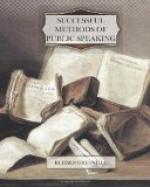THE DANGER OF IMITATION
It is a fatal mistake, as I have said, to set out deliberately to imitate some favorite speaker, and to mold your style after his. You will observe certain things and methods in other speakers which will fit in naturally with your style and temperament. To this extent you may advantageously adopt them, but always be on your guard against anything which might in the slightest degree impair your own individuality.
Speech for Study, with Lesson Talk
FEATURES OF AN ELOQUENT ADDRESS
You will find useful material for study and practise in the speech which follows, delivered by Lord Rosebery at the Unveiling of the Statue of Gladstone at Glasgow, Scotland, October 11th, 1902.
The English style is noteworthy for its uniform charm and naturalness. There is an unmistakable personal note which contributes greatly to the effect of the speaker’s words.
This eloquent address is a model for such an occasion, and a good illustration of the work of a speaker thoroughly familiar with his theme. It has sufficient variety to sustain interest, dignity in keeping with the subject, and a note of inspiration which would profoundly impress an audience of thinking men. It is a scholarly address.
Note the concise introductory sentences. Repeat them aloud and observe how easily they flow from the lips. Notice the balance and variety of successive sentences, the stately diction, and the underlying tone of deep sincerity.
Examine every phrase and sentence of this eloquent speech. Study the conclusion and particularly the closing paragraph. When you have thoroughly analyzed the speech, stand up and render it aloud in clear-cut tones and appropriately dignified style.
SPEECH FOR STUDY
AT THE UNVEILING OF THE STATUE OF GLADSTONE
(Address of Lord Rosebery)
I am here to-day to unveil the image of one of the great figures of our country. It is right and fitting that it should stand here. A statue of Mr. Gladstone is congenial in any part of Scotland. But in this Scottish city, teeming with eager workers, endowed with a great University, a center of industry, commerce, and thought, a statue of William Ewart Gladstone is at home.
But you in Glasgow have more personal claims to a share in the inheritance of Mr. Gladstone’s fame. I, at any rate, can recall one memory—the record of that marvelous day in December, 1879, nearly twenty-three years ago, when the indomitable old man delivered his rectorial address to the students at noon, a long political speech in St. Andrew’s Hall in the evening, and a substantial discourse on receiving an address from the Corporation at ten o’clock at night. Some of you may have been present at all these gatherings, some only at the political meeting.




